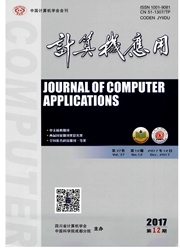

 中文摘要:
中文摘要:
针对传统粗粒度情感分析忽略具体评价对象,以及现有细粒度情感分析方法忽略无关评价要素的问题,提出结合条件随机场(CRF)和语法树剪枝的方法对产品评论进行细粒度情感分析。采用基于MapReduce的并行化协同训练(Tri-training)的方法对语料进行半自主标注,利用融合多种语言特征的条件随机场模型,获取评论中的评价对象和正负面评价词。通过建立领域本体和句法路径库实现语法树剪枝,对含有多个评价对象和评价词的文本,去掉无关评价对象的干扰,抽取出正确的评价单元,最后形成可视化产品报告。实验结果显示,提出的方法在两种不同领域数据集上,识别情感要素的综合准确率达89%左右,情感评价单元的综合准确率也达89%左右。实验结果表明,与传统方法相比,结合CRF和语法树剪枝的方法识别准确率更高,性能更好。
 英文摘要:
英文摘要:
The traditional sentiment analysis is coarse-grained and ignores the comment targets, the existing fine-grained sentiment analysis ignores multi-target and multi-opinion sentences. In order to solve these problems, a method of fine-grained sentiment analysis based on Conditional Random Field( CRF) and syntax tree pruning was proposed. A parallel tri-training method based on MapReduce was used to label corpus autonomously. CRF model of integrating various features was used to extract positive / negative opinions and the target of opinions from comment sentences. To deal with the multi-target and multiopinion sentences, syntax tree pruning was employed through building domain ontology and syntactic path library to eliminate the irrelevant target of opinions and extract the correct appraisal expressions. Finally, a visual product attribute report was generated. After syntax tree pruning, the accuracy of the proposed method on sentiment elements and appraisal expression can reach 89% approximately. The experimental results on two product domains of mobile phone and camera show that the proposed method outperforms the traditional methods on both sentiment analysis accuracy and training performance.
 同期刊论文项目
同期刊论文项目
 同项目期刊论文
同项目期刊论文
 期刊信息
期刊信息
